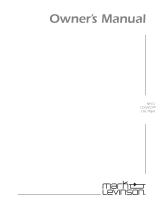
4
Thank You
Your decision to own this McIntosh MCD500 SACD/CD
Player ranks you at the very top among discriminating
music listeners. You now have “The Best.” The McIntosh
dedication to “Quality,” is assurance that you will receive
many years of musical enjoyment from this unit.
Please take a short time to read the information in this
manual. We want you to be as familiar as possible with all
the features and functions of your new McIntosh.
Please Take A Moment
The serial number, purchase date and McIntosh Dealer
name are important to you for possible insurance claim or
future service. The spaces below have been provided for
you to record that information:
Serial Number: __________________________________
Purchase Date: __________________________________
Dealer Name: ___________________________________
Technical Assistance
If at any time you have questions about your McIntosh
product, contact your McIntosh Dealer who is familiar
with your McIntosh equipment and any other brands that
may be part of your system. If you or your Dealer wish
additional help concerning a suspected problem, you can
receive technical assistance for all McIntosh products at:
McIntosh Laboratory, Inc.
2 Chambers Street
Binghamton, New York 13903
Phone: 607-723-1545
Fax: 607-724-0549
Customer Service
If it is determined that your McIntosh product is in need of
repair, you can return it to your Dealer. You can also return
it to the McIntosh Laboratory Service Department. For
assistance on factory repair return procedure, contact the
McIntosh Service Department at:
McIntosh Laboratory, Inc.
2 Chambers Street
Binghamton, New York 13903
Phone: 607-723-3515
Fax: 607-723-1917
Copyright 2008 © by McIntosh Laboratory, Inc.
Safety Instructions ............................................................2
Thank You and Please Take a Moment ............................. 4
Technical Assistance and Customer Service .................... 4
Table of Contents .............................................................. 4
General Information .........................................................4
Disc Information ............................................................... 5
Connector and Cable Information .................................... 5
Introduction .......................................................................6
MCD500 Features .............................................................6
Dimensions ....................................................................... 7
Installation ........................................................................8
Connections:
Rear Panel Connections ....................................................9
MCD500 Connections .................................................... 10
MCD500 Direct to Power Amplifier Connections ......... 11
Connection Diagrams (Separate Sheet) . Mc1A and Mc1B
Front Panel Features:
Front Panel Displays, Controls, Push-buttons and Jack.. 12
Front Panel Information Displays ................................... 13
Remote Control:
Remote Control Push-buttons ......................................... 14
How to Operate by Remote Control ............................... 15
Operation:
How to Operate the MCD500 ......................................... 16
Additional Information:
Specifications .................................................................. 22
Packing Instruction .........................................................23
Table of Contents
1. For additional connection information, refer to the
owner’s manual(s) for any component(s) connected to
the MCD500 SACD/CD Player.
2. The Super Audio Compact Discs Audio Signals are
converted internally from Digital to Analog. There is
no Digital Audio Signal present at the MCD500 Coaxial
and Optical Output Connectors during playback of a
SACD Disc.
3. A PCM version of the decoded MP3 and WMA Signals
is available at the Digital Audio Outputs.
4. The MCD500 internal Digital to Analog Converter is
designed to decode 2 channel PCM (Pulse Code Modu-
lation) signal present at the Coaxial or Optical Digital
Audio Input into 2 channel analog audio.
General Information






















